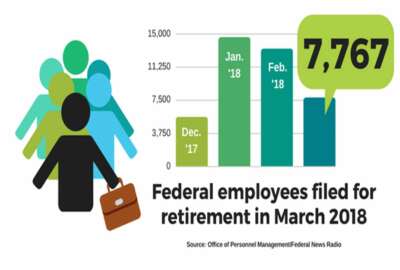

Threats to reform federal retirement systems are back, but in an election year, time appears to be on the side of workers and retirees with most members are anxious...
Congress and the Trump administration are expected to take another crack at making big-time changes in both Federal Employees Retirement System and the older Civil Service Retirement System. The idea is to require people under FERS to pay a larger share of the plans’ costs while working, and then lose protection from inflation when they retire.
Cost of living adjustments would be eliminated for FERS retirees under one plan and CSRS retirees would get cost of living adjustments that would be 0.5 percent less than the actual rate of inflation. Last year it appeared that at least the House would approve several among a variety of cuts that had been proposed by the GOP leadership and the White House.
The Senate took little interest in the plans. But they were out there, they were serious and for a while things looked grim for feds and retirees. Then Congress got onto other issues and, thanks to a major behind-the-scenes lobbying effort by federal-postal-retiree groups, the threat to the FERS and CSRS programs fizzled.
The threat is back but time appears to be on the side of workers and retirees. It is an election year and most members are anxious to spend as little time in Washington as possible. A variety of high-profile issues including immigration, digital privacy and trade issues could keep it from acting on other matters, such as “reform” of the FERS and CSRS programs.
In addition to the January 2019 pay freeze proposed by President Donald Trump, Congress could look at reducing the rate of the Thrift Savings Plan’s Government Securities Investment (G) fund, and a plan to base federal pensions for new retirees on the average of the highest five years of salary instead of the highest three.
So what do these proposals mean? What are the odds that any or all of them will be enacted into law this year? Or at some point during your career?
We will find out today when we talk with Jessica Klement, staff vice president, advocacy; and Jill Talley, deputy director, public relations, from the National Active and Retired Federal Employees Association. They will be guests on our Your Turn radio show 10 a.m. ET streaming at www.federalnewsradio.com or at 1500 AM in the D.C. area.
You can listen live or later while all shows are archived at the Your Turn page.
By Amelia Brust
Sharks’ teeth are cavity-resistant due to their fluoride covering. In addition, most sharks replace their teeth throughout their lives.
Source: (Livescience)
Copyright © 2025 Federal News Network. All rights reserved. This website is not intended for users located within the European Economic Area.
Mike Causey is senior correspondent for Federal News Network and writes his daily Federal Report column on federal employees’ pay, benefits and retirement.
Follow @mcauseyWFED

